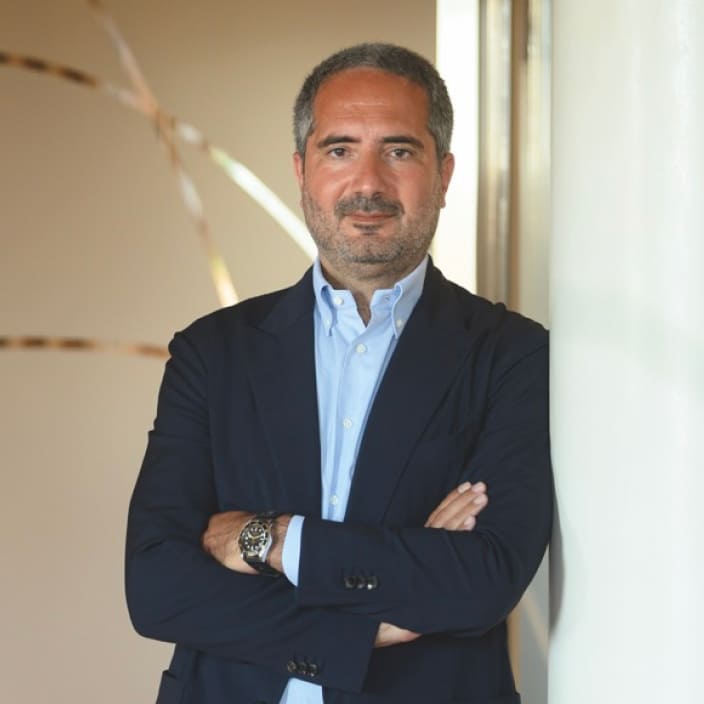
When its curve of value converges with that of its competitors, a company will likely be trapped in the red ocean of cutthroat competition. In fact, it will try to beat competitors on the basis of price or quality, forgetting about the demand – suggested by the authors of the best-seller “Blue Ocean Strategy” – that defies strategic logic and traditional business models: «What factors that have never been offered and are unknown to my industry should be created? What totally new sources will it take for my company to create value for stakeholders, generating new demand and allowing for strategic pricing?».
Thanks to the summer weather and an unusual location – the terrace of the Group’s Roman headquarters – we began an interview full of strategic ideas on the vision of the company with the CEO of Maire Tecnimont, Pierroberto Folgiero. «Entrepreneurship is the anti-bureaucracy. In an organization that has the right culture, everyone acts as if they own the company. In this regard, the creation of NextChem is a perfect example of entrepreneurship».

ACCORDING TO MAIRE TECNIMONT CEO PIERROBERTO FOLGIERO «THERE IS ENTREPRENEURSHIP WHEN A "COLLECTIVE PERSON" IS FORMED AND TAKES OWNERSHIP OF THE COMPANY, GUIDING IT BEYOND BUREAUCRACY AND ANY FEAR TO CHANGE, IN OTHER WORDS, BEYOND ITS COMFORT ZONE TOWARDS GROWTH THROUGH INNOVATION».
You have outlined the “mythological” figure of the entrepreneur-manager on more than one occasion: half “dreamer” half “doer”. Which direction is it all right to move in, in order to infuse the two identities with each other?
«The entrepreneur and the manager are two figures are both complementary and indispensable figures because the first must follow his impulse to open up the new roads he has imagined, while the manager will have to find the best possible way to organize the processes and the team to efficiently achieve the shared objectives. It is a combination of the managerial discipline of those who have studied organizational models, and the concrete experience of the entrepreneur who has faced a thousand battles in the field. However the entrepreneur is quintessentially a unique and original individual, who must transfer vision and spread a certain amount of courage to the managers to tranform that into action. There is entrepreneurship when a “collective person” is formed and takes ownership of the company, guiding it beyond bureaucracy, beyond any fear to change, in other words, beyond its comfort zone towards growth through innovation. When this happens, when in periods of uncertainty and difficulty the top management and the team are able to increase what I call the “managerial intensity”, that right mix between courage and concreteness, then we are in the presence of a high level of entrepreneurship. When I reflect upon this at Maire Tecnimont, I associate it with the launch of the corporate Mottos, which began in around 2015, a period when managers put a great deal of passion into metabolizing these entrepreneurial suggestions, were able to share them with their teams and turn them into concrete actions».
Mottos as a compass placed at the center of a company that is looking towards the future. Is it from there that we can start to define the characteristics of entrepreneurship?
«All of our MOTTOS represent a different perspective on the value of entrepreneurship: being able to meet challenges, valuing individual decisions, being adaptive and resilient, fighting bureaucracy and be in love with complexity. We are talking about a great exercise of participation in the business process, including participation on a psychological level. If the common denominator is indeed entrepreneurship, then it is useful to define its characteristics. With this in mind, a manager-entrepreneur will need to start by having a concrete vision, which is the first of the three pillars. A vision that looks beyond one’s own comfort zone, one that drives us to understand what lies beyond the obstacle and to overcome the existing situation. If a manager-entrepreneur frees himself from the fear of constraints, he will be able to see scenarios that not everyone can see because they are complex to imagine to reach».
Then there are the other two characteristics.
The vision needs to be shared and then, of course, executed with its roots put in the ground. Sharing the vision is never an easy task, because you need to involve and co-opt the people around you, colleagues, employees, collaborators, technicians: everyone must try to imagine an identical point of arrival. If a leader, starting with the vision, knows how to get people to follow him, he will gain charisma and will find a larger and larger group that will start walking with him. But then there must be concrete realization: if a vision remains unexecuted, it is only a philosophy... The manager-entrepreneur sees the hard parts, shares challenging goals and turns them into action, thanks to his or her courage and management skills. In essence, he charts a direction, establishes a shared course, and sets off to sea. There is nothing more exciting for those in our profession than to see a thought transformed into action: it is the power of the example»

That’s why, as one of the Mottos goes, every micro-decision counts.
«That’s exactly right. The success of an organization, especially complex ones that operate in multifaceted markets like Maire Tecnimont, depends on a long series of sub-objectives and tasks that must be “atomized” and shaped as decisions. The more the results depend on a great number of actions that must be synchronized and aligned in their vision, the more crucial widespread entrepreneurship becomes. In our industry, where you start with a large critical mission that becomes a sum of critical activities, to achieve the goal of excellence you need to know how to develop, attack, confront, and discharge the vision with a sense of entrepreneurship. By spreading the entrepreneurial mindset, we know that the phrase, “every micro-decision counts”, is not a meaningless thought, but a strategic way of living the company, of dealing with difficult decisions, uncertain conditions, and challenging goals.
It’s what Chairman Fabrizio Di Amato and I call the “sacred fire” of living entrepreneurship. The great thing is that this passion for challenging goals is a character trait that sets us apart and makes us recognize each other. In our business, when faced with a crossroads between an easy or a difficult path, between a submissive or an ambitious choice, between a prudent or a courageous attitude, we already know that we have to proceed in the most uncomfortable direction. Also, because at that point there won’t be a person to show you the way: where there is widespread entrepreneurship, all managers - even without talking to each other – know, within themselves, which direction will be the right one to take».
You have stated that a true entrepreneur is one who knows how to share success. Is this another step?
«It’s the next step of the three pillars I mentioned earlier: sharing success means aligning everyone’s interests. When we started with the phase of engaging our human capital at Maire Tecnimont, we provided tools and projects to facilitate the sharing of business results. Within the group there is an overall vision where entrepreneurial thinking guides the whole dynamic of the company, up to the sharing of results. It’s true that we’re usually rather demanding of the manager-entrepreneur, who will have to answer for a project by taking calculated risks: however, it’s also true that in the end there’s always a system of rewards. Is there ever a risk without a reward? That is unlikely, just as a risk-free reward doesn’t make much sense... From the emotional standpoint of participation for success, there must be room for reward systems: if we do not compensate risk-taking, the loop will never come full circle. To cite one example (others will be explored in more detail in the interview with Sara Frassine, published on page 18), our Employees Share Ownership Plan, which in the three-year period 2016-2018 had an adherence of more than 96% of the employees involved, is a concrete project to share company benefits».
Where does the bureaucratic approach fit into this discussion?
«At the opposite end of the spectrum of entrepreneurship. That distinctive way in which a manager shies away from constraints and obstacles in the company is the exact opposite of what we are talking about. The bureaucrat operates on the assumption that the company always belongs to someone else, freezes in the face of unreceived input, and always blames circumstances beyond his control. Are you familiar with the Mandarins? In imperial China, officials tried to sign as few documents as possible
to leave no trace of their responsibility. The vision of the top management didn’t matter so much: the bureaucrat has his own vision, knows perfectly well how things should be done but uses his skills in reverse, to do nothing and leave everything as it was. Though it must be said that, in my experience, there is no form of bureaucracy that blocks an entrepreneur from thinking and acting. When the entrepreneur is caught up in the game of bureaucracy, he reacts by shooting. In a game of bocce, when things start to go wrong, the bureaucrat is the one who leaves the balls on the ground because he is afraid of making things worse, while the entrepreneur is the one who “rolls”. With a direct and energetic move, he turns the game around!».
Getting back to rewards, those who embrace the “Ride the Turnaround” logic receive their just rewards. What happens for those who are struggling to get into the flow?
«The theme “leave no one behind” is a core spirit that we live out every day, in every way. It would be a biased view that provides rewards for only those who are “doing well” and does not address those who may be having difficulties, as happens in all professions around the world. In opposition to the bureaucratic approach, we have developed a very conscious culture of feedback, that of returning constructive observations when results haven’t been achieved. Every business theorist knows that performance is often represented by the Gaussian distribution: alternating ups and downs. Statistically, for every over performer in a medium-large sample, there is an under performer, so in the “low” moments of the life cycle it is necessary to draw on the source code of resilience, the hormone that we put into circulation when we were able to play on the attack. This is part of what is known as a company’s “immune system”, a crucial issue that acts as a watershed when you’re forced to retreat on defense due to increased instability»

THE ENTREPRENEUR IS QUINTESSENTIALLY A UNIQUE AND ORIGINAL INDIVIDUAL
In the time of a pandemic, what do we need to focus on in regard to human capital?
«As I was saying, in the “Mediterranean” spirit of enterprise, the Anglo-Saxon culture of feedback has struggled to emerge, more for ideological reasons than anything else. I believe instead that under performers should not be sidelined but rather involved and stimulated through training and mentorship programs. The goal is to raise the amount of attention given to those who have not developed the entrepreneurial attitudes we are talking about, including through the use of feedback. It is a “stop and coach” method: when you are experiencing difficulties, you stop and, together with a specialist, start up again in order to improve your professional career. From the start of the pandemic, the resilient system developed by Maire Tecnimont allowed everyone to respond with a great sense of responsibility, both towards external parties as well as towards colleagues, collaborators and internal team members. As we said a few months ago, our “champions” are swimming upstream like salmon in rivers, spreading adaptive approaches and using, with increasing competence, the digital technology that is changing our professional lives».
What is the most tangible example you can think of in the area of entrepreneurial culture?
«I immediately think about the launch of NextChem, the company within Maire Tecnimont that operates in the field of green chemistry and technologies to support the energy transition. In order to land in the blue ocean of green chemistry we made NextChem grow as an internal start-up, imagining new scenarios in a market that no one had yet seen or occupied. Then, when the vision – aligned with the vision of the Group – was shared by an initial squad of pioneers and brought to life, we began working within complex contexts that would have driven many to give up. For our part, in full entrepreneurial spirit, we have not been affected by uncertainty, instead living it as an opportunity to be transformed into business. In companies that do difficult work, if there are those who can develop this ability to see things that no one else sees – in places, contexts and territories that are designated for something else entirely – and if the organization manages to “synthesize” this hormone of vision, then all the conditions are in place to achieve surprising results. This means that all of the team members are aligned in this search for blue markets. Everyone feels equally important, including the assistant who, if she can’t find a seat on the usual plane, will do everything he or she can to get that manager to his or her destination on time. In the end my mind often goes back to a quote by Goethe: “Whatever you can do, or dream you can, begin it. Boldness has genius, power and magic in it”. It is the example of Elon Musk, who for many years was the first to envision an electric car company as a technological enterprise and an independent automobile manufacturer. He was the first to see this prospective: then, as Goethe says, he began to move within it, according to a self-fulfilling prophecy. He began to believe in it, adapt to difficulties, and take advantage of opportunities. He, like so many others, didn’t have all the variables under his control: an entrepreneur starts out by believing and along the way he builds. Then, of course, he must acquire the ability to be a “doer”, as well, perhaps on his own or surrounded by good managers. Without the ability to do, to put the vision into practice, everything remains an abstract dream. And none of us want to work in companies that have ended up on a dead-end track, in what Americans call the Death Valley of innovation. Only by continuing to employ our Italian entrepreneurial mindset, operational skills, technology and engineering will we continue to stand out in an increasingly competitive field. Where every single decision made by every single person can truly make the difference».
Cultivating entrepreneurship